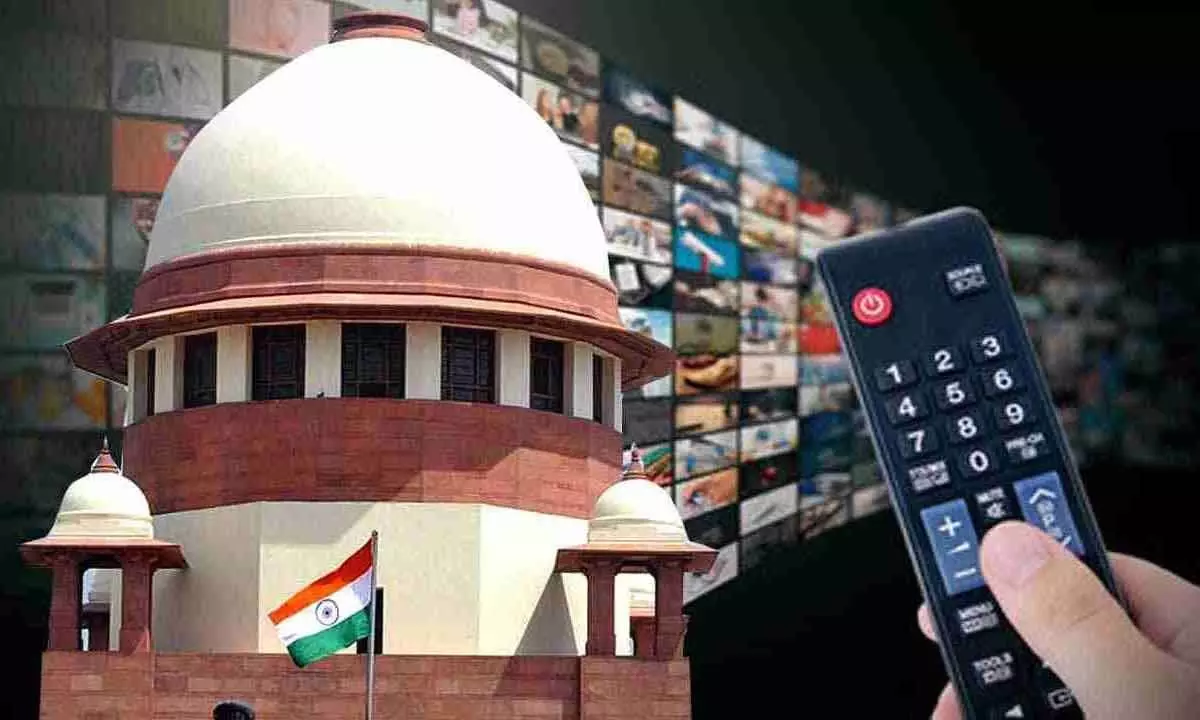Live
- Vajpayee’s legacy lives on as country marks his birth centenary
- Rythu Bharosa to pick best from PM -KISAN scheme
- Medak wears season’s festive look
- TG sets record in fine rice purchase
- Maintaining India’s growth momentum
- Study Reveals Teabags Release Billions of Microplastics and Nanoplastics, Entering Your Body
- Workplace Wonders: Creative Secret Santa Gifts for Colleagues
- Kumbh Mela 2025: Essential Guide to Comfortable and Respectful Attire for Maha Kumbh
- Hyderabad Real Estate Faces Setback: Property Sales Drop 7% Year-on-Year in 2024
- Gnani’s Gen AI Solutions Revolutionising BFSI
Just In
Self-regulation by TV channels needs strengthening: Supreme Court


The apex court says that fine against TV channels must be proportionate to profits made from the show
New Delhi: The Supreme Court has underlined the need to "strengthen" the self-regulation mechanism of television channels. A bench headed by Chief Justice of India D Y Chandrachud verbally observed that the "self-regulatory" framework of television channels needs to be made "more effective".
Making it clear that it does not want to impose any censorship on the media, the Chief Justice stressed the need for having an effective self-regulatory mechanism and said some channels went "berserk" during the coverage of actor Sushant Singh Rajput’s death case. The top court asked the News Broadcasters Association (NBA), which is now known as News Broadcasters and Digital Association (NBDA) and has a self-regulatory mechanism, to take inputs from the chairperson of News Broadcasting and Digital Standards Authority, Justice (retd) A K Sikri, and its former chief Justice (retd) R V Raveendran, both former Supreme Court judges.
It noted that the self-regulatory mechanism can be strengthened after taking note of all existing material, including the inputs of former apex court judges. The apex court also noted the maximum penalty which can be imposed on a TV news channel for violation of the self-regulatory mechanism is just Rs 1 lakh, which was fixed way back in 2008. "We are completely with you that we must be circumspect about regulation by the government because we don’t want to impose a pre-censorship or post censorship on the media," the bench, also comprising Justices J B Pardiwala and Manoj Misra, told senior advocate Arvind Datar, who was appearing for the association. "We commend you for having a self-regulatory mechanism but that has to be effective," it said while hearing a plea filed by the association against the January 2021 observations by the Bombay High Court. The high court had said media trials amounted to contempt of court and urged the press not to cross the proverbial "Lakshman Rekha", as it found the coverage of actor Sushant Singh Rajput’s death case by some news channels as "contemptuous".
It had observed that existing self-regulatory mechanisms could not take the character of a statutory mechanism. As per information available on the NBDA’s website, it represents private television news, current affairs and digital broadcasters and is the collective voice of news, current affairs and digital broadcasters in India.
It says the NBDA currently has 27 leading news and current affairs broadcasters (comprising 125 news and current affairs channels) as its members. The apex court issued notice to the Centre and others seeking their responses on the association’s plea.
"We are of the considered view that it would be necessary for this court to consider as to whether steps, which have already been taken for constituting a self-regulatory mechanism, are to be strengthened,” the bench said. During the hearing, when Datar referred to the media hype after Rajput’s death, the bench observed. "Because of the kind of frenzy after the death of that actor, everybody went berserk presuming it is a murder.

© 2024 Hyderabad Media House Limited/The Hans India. All rights reserved. Powered by hocalwire.com






